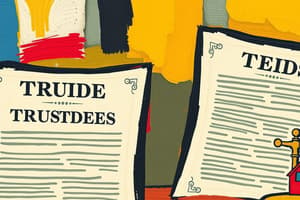Podcast
Questions and Answers
A deed of trust involves two parties: the lender and the borrower.
A deed of trust involves two parties: the lender and the borrower.
False (B)
In a conventional loan agreement, the lender cannot call in the loan if the borrower sells the property.
In a conventional loan agreement, the lender cannot call in the loan if the borrower sells the property.
False (B)
A promissory note used for a real estate transaction is always accompanied by a security instrument.
A promissory note used for a real estate transaction is always accompanied by a security instrument.
True (A)
Compound interest is computed annually on the remaining principal balance of a real estate loan.
Compound interest is computed annually on the remaining principal balance of a real estate loan.
Signup and view all the answers
A mortgagor is not responsible for paying property taxes or maintaining property insurance.
A mortgagor is not responsible for paying property taxes or maintaining property insurance.
Signup and view all the answers
When market interest rates increase, borrowers often choose to refinance to take advantage of the higher rates.
When market interest rates increase, borrowers often choose to refinance to take advantage of the higher rates.
Signup and view all the answers
A deed of trust involves three parties: the lender, the borrower, and an independent trustee.
A deed of trust involves three parties: the lender, the borrower, and an independent trustee.
Signup and view all the answers
Conventional loan agreements usually contain a defeasance clause allowing borrowers to assume the loan on original terms.
Conventional loan agreements usually contain a defeasance clause allowing borrowers to assume the loan on original terms.
Signup and view all the answers
A promissory note for a real estate transaction is frequently accompanied by a mortgage or a deed of trust.
A promissory note for a real estate transaction is frequently accompanied by a mortgage or a deed of trust.
Signup and view all the answers
When market interest rates decrease, borrowers often opt to refinance to benefit from the lower rates.
When market interest rates decrease, borrowers often opt to refinance to benefit from the lower rates.
Signup and view all the answers



